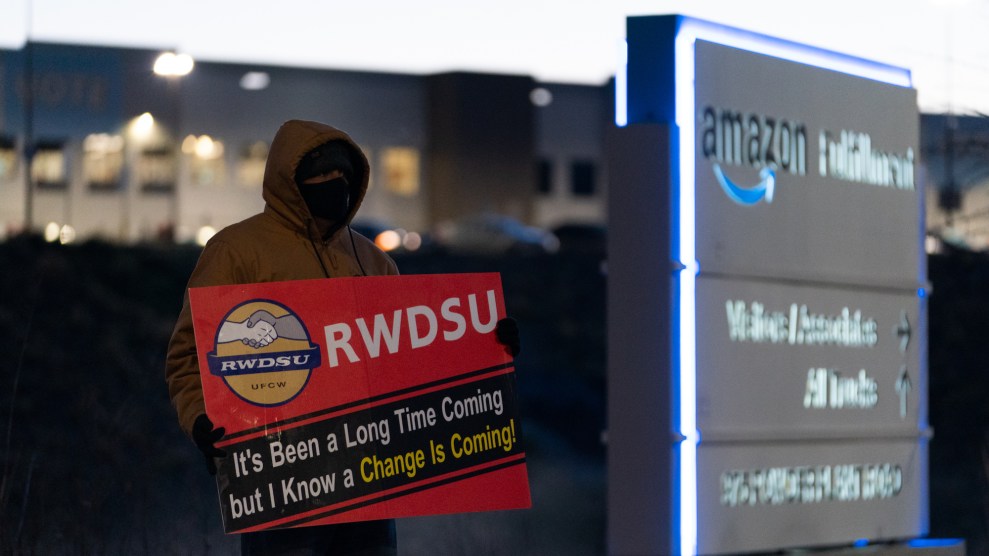
One might hope and expect that a union, of all employers, would nurture a healthy workplace culture for its staff. But that’s not necessarily the case, as Ellen (a pseudonym) discovered after accepting a job with a California union during the late 1990s.
When I was in my late 20s, I took a research position with a local labor union. The union’s mission was to help low-wage service workers, including cleaners and food servers, organize for better working conditions and dignity on the job. The only problem was, our bosses didn’t care about the dignity of their own workers.
In some ways it was the best job I’ve ever had: meaningful, challenging, lots of great people. The union was badass. The workers we represented were loyal and devoted. They were militant when called upon to strike or boycott employers. Prevailing local wages and benefits for their jobs were among the best in the country. The union would run a precision operation of buses from job sites to the union hall for votes or grassroots mobilizations, with participation rates exceeding 90 percent. Our campaigns were no joke.
But the leadership ran the place like a cult. They separated us from our families and blurred the lines between work and not work.
Early on, I traveled out of state to meet other union staff and get trained. They inexplicably took me to a funeral. It was tragic. A researcher I didn’t yet know had lost a baby to sudden infant death syndrome. I found myself crying in church in front of an open casket—it was a Catholic service and the poor baby was in a frilly white gown. I was meeting new people while offering condolences. Then I was whisked back to the office to finish the work day. Talk about whiplash.
I soon realized the trip was more than a one-off. We union staffers were fully expected to sacrifice our personal lives and put in long hours, including most nights and weekends, to help the working class rise up.
One time, after I called in sick, a supervisor still wanted me on a spontaneous conference call. That same guy called me at home months later to ask me to move to a less-union-friendly city to work on an organizing campaign. I had just bought a house with my boyfriend. The deep roots I was putting down allowed me to dodge that bullet. But this boss made clear I would have to work harder to be considered “down” for class struggle. I wasn’t worthy!
The sacrifices seemed reasonable at first to the naive younger me. I walked picket lines at lunch time and at night, and met with co-workers for strategy sessions or went door-knocking for political campaigns on weekends. We were expected to pay union dues to show solidarity with the workers, even though we weren’t technically members.
I was getting more accustomed to the union’s cultlike personality, but I was still taken aback when not one but two male staffers hit on me at work. One of them would softly chant under his breath, “You and me, you and me,” until I finally worked up the guts to tell him there was no “you” with me.
Later a married man with influence over my work awkwardly suggested that we have an affair. Really? We worked in a place dedicated to shifting the lopsided power dynamic between bosses and workers. But I knew that telling the leadership I was being propositioned by men who had already proved their worth to the cult would probably result in my having to leave the union. On top of my failure to match their devotion to the cause, this all happened more than 20 years before #MeToo. I politely declined his offer, which had made our work relationship unbearable, and kept working. But the shit really hit the fan when I decided to get married.
I was set to take a three-week honeymoon around the same time that a labor contract involving the largest employers in our sector was about to expire. My supervisor had approved my vacation request well in advance. But when the union president found out, he flipped. He called me into an empty office. He was agitated and said he wanted to block my honeymoon plans, but couldn’t do so in good conscience, given the prior approval. He said it was up to me to change my plans myself. Dumbass that I was, I agreed.
But my boyfriend saw the request as a litmus test for the rest of our lives together. He asked me not to delay our honeymoon for the union. I went back to the president and tearfully told him I couldn’t.
After this act of insubordination, I became the target of a subtle campaign to teach me that the union must come first. The president denied my request to leave the union hall—on a Saturday—to pick up my wedding shoes from a nearby shop. When I finished my assignment and left at the end of the day to run wedding errands, I was summoned and reprimanded for leaving before the rest of the staff had finished.
I pointed out that we didn’t normally need to be dismissed. The boss responded by criticizing me, but in a way designed to hurt a lefty do-gooder the most. He said that by questioning instructions and therefore implying that they weren’t clearly delivered, I was disrespecting a union leader whose first language was not English. I knew he was playing me, but I was still devastated.
I got married and enjoyed my honeymoon. Then I busted my ass for the contract campaign. I wanted to stay in the good fight, but my employer’s miserable work environment was too much. The final irony? The union staff actually had a staff union to which we also paid dues, but it did nothing to protect us. Not long after the contract was settled, I broke up with my job. But at least I’m still married.
This story is part of our Bad Bosses project, a reported collection of accounts from workers about their terrible bosses and the system that creates them. You can read more about the entire project and find every story here. Annotations—highlighted throughout—can be clicked for further context and comment from other parties. Got your own bad boss story? Send us an email.
















